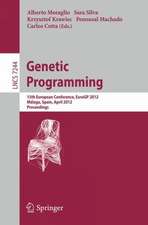Linear Genetic Programming: Genetic and Evolutionary Computation
Autor Markus F. Brameier, Wolfgang Banzhafen Limba Engleză Hardback – 11 dec 2006
This book serves as a reference for researchers; it also contains sufficient introductory material for students and those who are new to the field.
| Toate formatele și edițiile | Preț | Express |
|---|---|---|
| Paperback (1) | 988.81 lei 6-8 săpt. | |
| Springer Us – 29 noi 2010 | 988.81 lei 6-8 săpt. | |
| Hardback (1) | 995.09 lei 6-8 săpt. | |
| Springer Us – 11 dec 2006 | 995.09 lei 6-8 săpt. |
Din seria Genetic and Evolutionary Computation
- 20%
 Preț: 934.69 lei
Preț: 934.69 lei - 20%
 Preț: 590.21 lei
Preț: 590.21 lei - 20%
 Preț: 997.25 lei
Preț: 997.25 lei - 20%
 Preț: 651.42 lei
Preț: 651.42 lei - 20%
 Preț: 614.43 lei
Preț: 614.43 lei - 20%
 Preț: 650.08 lei
Preț: 650.08 lei - 20%
 Preț: 332.24 lei
Preț: 332.24 lei - 20%
 Preț: 649.09 lei
Preț: 649.09 lei - 20%
 Preț: 996.40 lei
Preț: 996.40 lei - 20%
 Preț: 643.17 lei
Preț: 643.17 lei - 20%
 Preț: 331.08 lei
Preț: 331.08 lei - 20%
 Preț: 340.32 lei
Preț: 340.32 lei - 20%
 Preț: 333.72 lei
Preț: 333.72 lei - 20%
 Preț: 651.23 lei
Preț: 651.23 lei - 20%
 Preț: 336.02 lei
Preț: 336.02 lei - 20%
 Preț: 1050.86 lei
Preț: 1050.86 lei - 20%
 Preț: 1458.70 lei
Preț: 1458.70 lei - 20%
 Preț: 983.71 lei
Preț: 983.71 lei - 20%
 Preț: 992.44 lei
Preț: 992.44 lei - 20%
 Preț: 1048.53 lei
Preț: 1048.53 lei - 20%
 Preț: 1473.24 lei
Preț: 1473.24 lei - 20%
 Preț: 939.31 lei
Preț: 939.31 lei - 20%
 Preț: 593.54 lei
Preț: 593.54 lei
Preț: 995.09 lei
Preț vechi: 1243.86 lei
-20% Nou
Puncte Express: 1493
Preț estimativ în valută:
190.44€ • 198.08$ • 157.21£
190.44€ • 198.08$ • 157.21£
Carte tipărită la comandă
Livrare economică 15-29 aprilie
Preluare comenzi: 021 569.72.76
Specificații
ISBN-13: 9780387310299
ISBN-10: 0387310290
Pagini: 315
Ilustrații: XV, 315 p.
Dimensiuni: 155 x 235 x 28 mm
Greutate: 0.64 kg
Ediția:2007
Editura: Springer Us
Colecția Springer
Seria Genetic and Evolutionary Computation
Locul publicării:New York, NY, United States
ISBN-10: 0387310290
Pagini: 315
Ilustrații: XV, 315 p.
Dimensiuni: 155 x 235 x 28 mm
Greutate: 0.64 kg
Ediția:2007
Editura: Springer Us
Colecția Springer
Seria Genetic and Evolutionary Computation
Locul publicării:New York, NY, United States
Public țintă
ResearchCuprins
Fundamental Analysis.- Basic Concepts of Linear Genetic Programming.- Characteristics of the Linear Representation.- A Comparison with Neural Networks.- Method Design.- Linear Genetic Operators I — Segment Variations.- Linear Genetic Operators II — Instruction Mutations.- Analysis of Control Parameters.- A Comparison with Tree-Based Genetic Programming.- Advanced Techniques and Phenomena.- Control of Diversity and Variation Step Size.- Code Growth and Neutral Variations.- Evolution of Program Teams.- Epilogue.
Recenzii
From the reviews:
"This is a very good book. It provides a well organized description of linear genetic programming (LGP). Much material, previously only available in research papers, has been consolidated, reorganized and extended for this book. … This book is primarily for the evolutionary computing researcher … . Post graduate students in genetic programming should read this book … . The book should be in university libraries. Considering the cost of many books these days this one is very well priced for its size and content." (Vic Ciesielski, Genetic Programming and Evolvable Machines, Vol. 9, 2008)
"This book addresses a subfield of genetic programming, where solutions are represented by a sequence of instructions in an imperative programming language, such as C. Genetic programming is an iterative search algorithm based loosely on the concepts of biological evolution. … Brameier and Banzhaf present a thorough overview that will serve as an excellent resource for graduate students, academics, and practitioners, who choose to work with linear genetic programming." (Steven Gustafson, ACM Computing Reviews, Vol. 49 (8), August, 2008)
"This is a very good book. It provides a well organized description of linear genetic programming (LGP). Much material, previously only available in research papers, has been consolidated, reorganized and extended for this book. … This book is primarily for the evolutionary computing researcher … . Post graduate students in genetic programming should read this book … . The book should be in university libraries. Considering the cost of many books these days this one is very well priced for its size and content." (Vic Ciesielski, Genetic Programming and Evolvable Machines, Vol. 9, 2008)
"This book addresses a subfield of genetic programming, where solutions are represented by a sequence of instructions in an imperative programming language, such as C. Genetic programming is an iterative search algorithm based loosely on the concepts of biological evolution. … Brameier and Banzhaf present a thorough overview that will serve as an excellent resource for graduate students, academics, and practitioners, who choose to work with linear genetic programming." (Steven Gustafson, ACM Computing Reviews, Vol. 49 (8), August, 2008)
Notă biografică
Markus Brameier received a PhD degree in Computer Science from the Department of Computer Science at University of Dortmund, Germany,in 2004. From 2003 to 2004 he was a postdoctoral fellow at the Stockholm Bioinformatics Center (SBC), a collaboration between Stockholm University, the Royal Institute of Technology, and Karolinska Institute, in Sweden. Currently he is Assistant Professor at the Bioinformatics Research Center (BiRC) of the University of Aarhus in Denmark. His primary research interests are in bioinformatics and genetic programming.
Wolfgang Banzhaf is a professor of Computer Science at the Department of Computer Science of Memorial University of Newfoundland, Canada, and head of the department since 2003. Prior to that, he served for 10 years as Associate Professor for Applied Computer Science in the Department of Computer Science at University of Dortmund, Germany. From 1989 to 1993 he was a researcher with Mitsubishi Electric Corp.,first in MELCO’s Central Research Lab in Japan, then in the United States at Mitsubishi Electric Research Labs Inc., Cambridge, MA. Between 1985 and 1989 he was a postdoc in the Department of Physics, University of Stuttgart, Germany. He holds a PhD in Physics from the University of Karlruhe in Germany. His research interests are in the field of artificial evolution and self-organization studies. He has recently become more involved with bioinformatics.
Wolfgang Banzhaf is a professor of Computer Science at the Department of Computer Science of Memorial University of Newfoundland, Canada, and head of the department since 2003. Prior to that, he served for 10 years as Associate Professor for Applied Computer Science in the Department of Computer Science at University of Dortmund, Germany. From 1989 to 1993 he was a researcher with Mitsubishi Electric Corp.,first in MELCO’s Central Research Lab in Japan, then in the United States at Mitsubishi Electric Research Labs Inc., Cambridge, MA. Between 1985 and 1989 he was a postdoc in the Department of Physics, University of Stuttgart, Germany. He holds a PhD in Physics from the University of Karlruhe in Germany. His research interests are in the field of artificial evolution and self-organization studies. He has recently become more involved with bioinformatics.
Textul de pe ultima copertă
Linear Genetic Programming examines the evolution of imperative computer programs written as linear sequences of instructions. In contrast to functional expressions or syntax trees used in traditional Genetic Programming (GP), Linear Genetic Programming (LGP) employs a linear program structure as genetic material whose primary characteristics are exploited to achieve acceleration of both execution time and evolutionary progress. Online analysis and optimization of program code lead to more efficient techniques and contribute to a better understanding of the method and its parameters. In particular, the reduction of structural variation step size and non-effective variations play a key role in finding higher quality and less complex solutions. This volume investigates typical GP phenomena such as non-effective code, neutral variations and code growth from the perspective of linear GP.
The text is divided into three parts, each of which details methodologies and illustrates applications. Part I introduces basic concepts of linear GP and presents efficient algorithms for analyzing and optimizing linear genetic programs during runtime. Part II explores the design of efficient LGP methods and genetic operators inspired by the results achieved in Part I. Part III investigates more advanced techniques and phenomena, including effective step size control, diversity control, code growth, and neutral variations.
The book provides a solid introduction to the field of linear GP, as well as a more detailed, comprehensive examination of its principles and techniques. Researchers and students alike are certain to regard this text as an indispensable resource.
The text is divided into three parts, each of which details methodologies and illustrates applications. Part I introduces basic concepts of linear GP and presents efficient algorithms for analyzing and optimizing linear genetic programs during runtime. Part II explores the design of efficient LGP methods and genetic operators inspired by the results achieved in Part I. Part III investigates more advanced techniques and phenomena, including effective step size control, diversity control, code growth, and neutral variations.
The book provides a solid introduction to the field of linear GP, as well as a more detailed, comprehensive examination of its principles and techniques. Researchers and students alike are certain to regard this text as an indispensable resource.
Caracteristici
One of the few books that deals solely with linear GP and contains a number of concrete, experimental results Methods and analysis techniques are specifically adapted to the LGP approach, analyzing LGP in more detail while concentrating on principle characteristics of an imperative program structure in comparison to a tree representation Includes supplementary material: sn.pub/extras

















